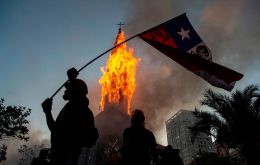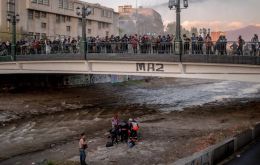MercoPress. South Atlantic News Agency
Tag: protests
-
Monday, October 26th 2020 - 09:56 UTC
Chile overwhelmingly approved a constitutional reform with a specially elected assembly

The referendum in Chile was held on Sunday with a resounding result in favor of reforming the constitution. After last year's social protests, it was decided to consult citizens if they wanted to begin the process of promulgating a new Chilean constitution, leaving the one approved during the time of Augusto Pinochet in 1980 without effect.
-
Saturday, October 24th 2020 - 09:40 UTC
A tale of two Chiles; referendum on constitutional reform

By Jennifer M Piscopo and Peter Siavelis (*) – One year ago, Chileans took their anger over inequality and injustice to the streets, insisting that redressing the nation's deep structural problems would require more than reform. They said Chile would need a new constitution with more rights and better social protection.
-
Monday, October 19th 2020 - 09:51 UTC
Chileans mark anniversary of mass protests with peaceful rallies in the morning and riots and looting at night

Tens of thousands of Chileans gathered in the central square of Santiago, Plaza Italia, renamed Plaza Dignidad, to mark the one-year anniversary of mass protests that leftover 30 dead and thousands injured, with peaceful rallies on Sunday turning by nightfall into riots and looting.
-
Monday, October 12th 2020 - 09:20 UTC
Rioting and protests continue in Chile against government and police brutality

Chileans took to the streets of the capital, Santiago, for a third consecutive weekend, demonstrating against the government, inequality, and police brutality as a postponed referendum on constitutional changes nears.
-
Monday, October 5th 2020 - 09:32 UTC
Authorities in Chile arrest officer who allegedly threw teen ager from a bridge

Authorities in Chile have arrested a police officer who allegedly threw a teen-ager from a bridge into a river bed during a protest.
-
Monday, September 14th 2020 - 11:55 UTC
Mayor of Bogota calls for reconciliation following nights of shootings and rioting because of police brutality

The mayor of Bogota begged forgiveness on Sunday and called for reconciliation after protests in Colombia's capital the past week left 11 civilians dead and hundreds injured.
-
Monday, September 14th 2020 - 11:45 UTC
Dozens of arrests in Santiago on the 47th anniversary of the Pinochet coup that deposed president Allende

Chilean police said that on Saturday that more than 100 people were arrested after clashes marking the 47th anniversary of the coup d'etat that overthrew the populist leftist government of Salvador Allende.
-
Saturday, August 29th 2020 - 08:54 UTC
Wisconsin: Teenager charged with killing two protestors, “acted in self defense” argues his attorney

A high-profile lawyer representing the 17-year-old shooter charged with killing two protesters and wounding another during demonstrations on the streets of Kenosha, Wisconsin said on Friday that his client had acted in self-defense.
-
Friday, June 26th 2020 - 09:24 UTC
UN human rights office calls for moratorium in use of facial recognition technology

The UN human rights chief called on Thursday for a “moratorium” on the use of facial recognition technology during peaceful protests, stressing that it could increase discrimination against people of African descent and other minorities.
-
Tuesday, June 16th 2020 - 08:32 UTC
Brazilian Attorney General Office investigating hospital invasions by Bolsonaro supporters

Brazil's Attorney General has called for an investigation into several invasions of hospitals in the country after its President called on Brazilians to inspect the conditions of medical wards treating Covid-19 patients.
